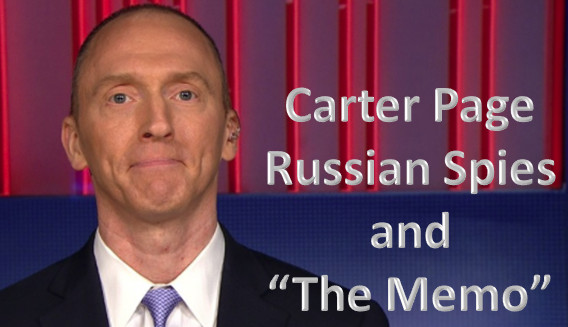
The U.S. Power Problem
By Vicky Davis
Correction: Donald Trump considered running for the Presidency in 2012 which means that the set up occurred within a year of that. 2010 was the year I wrote about the foreign trade zones and there was a huge interest in those stories including one guy in particular who was in New York and who was pushing for Trump to run. 2/7/2018
The recent release of the memo summarizing the abuse of power within the Justice Department to depose President Donald J. Trump represents an attempt at a coup d’etat on the American government. You’d never know it by the mainstream media coverage. Television news isn’t news, its entertainment provided by vacuous men and women who discuss issues with all the depth of a hen party discussing neighborhood gossip.
The issues are layered and complex and the stakes are high – the future of the country and the direction it takes. This is the fork in the road.
The United States has a power problem. It’s no longer clear where the boundaries of power are and it’s not clear who holds the levers of power. It’s not even clear from where the sources of power derive due to the number of international agreements the U.S. Senate has approved.
The Immediate Issue
Carter Page, was appointed to be a foreign policy adviser to the Trump Campaign. On paper, Page has an impressive academic background but in the business world, his credentials are less than sterling. He marketed himself as an Energy Consultant even though his academic background was in National Security. Noteworthy is the fact that his father was a manager and executive with the Central Hudson Gas & Electric Company in Poughkeepsie, NY. Page worked for Merrill Lynch beginning in 2000 in their London and Moscow offices. He claims to have worked on transactions for Gazprom. He didn’t make much of a splash at Merrill. He left in 2008.
The allegations of the U.S. Department of Justice are that Carter Page had connections to a Russian spy ring and by extension, they’ve been trying to tie that anchor around Donald Trump’s neck to sink his presidency. Honestly, this story is so dumb it’s an embarrassment to see it reported as if it were real news.
The co-conspirators in the alleged spy ring are:
Evgeny Burykakov, 39 allegedly posed as an employee in the New York office of a Russian Bank
Igor Sporyshev, 40 was a trade representative for the Russian Government in New York
Victor Podobnyy, 27 was serving as an attaché to Russia’s mission at the United Nations
In January of 2015 when the FBI announced that a spy ring was broken up, CNN published an article with a video that included FBI surveillance footage of the Russian co-conspirators. The video shows the conspirators on park benches and in dark hallways passing papers by stealth from one to the other.
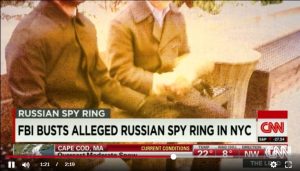
The footage is right out of a 1960’s spy movie – and not even a good one at that. Towards the bottom of the article, there is one juicy tidbit that is the giveaway to the story:
FBI undercover source
A source working for the FBI met with Buryakov in the summer of 2014, posing as a representative of a wealthy person wanting to invest in the casino business in Russia.
An April 5, 2017 Reuters article reported:
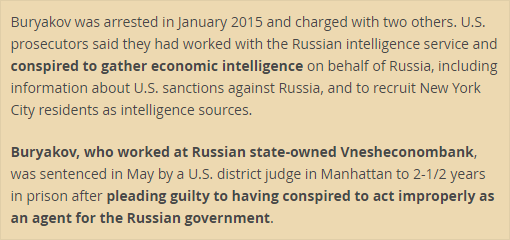
Buryakov was arrested in January 2015 and charged with two others. U.S. prosecutors said they had worked with the Russian intelligence service and conspired to gather economic intelligence on behalf of Russia, including information about U.S. sanctions against Russia, and to recruit New York City residents as intelligence sources.
Buryakov, who worked at Russian state-owned Vnesheconombank, was sentenced in May by a U.S. district judge in Manhattan to 2-1/2 years in prison after pleading guilty to having conspired to act improperly as an agent for the Russian government.
The point being that Buryakov did in fact work for a bank and he was approached by somebody (who was working for the FBI) who said that a wealthy businessman might be interested in investing in a casino in Russia.
What banker wouldn’t be interested in a deal like that? And can we guess the name the FBI’s informant might have used? Does Taj Mahal ring any bells? Donald Trump perhaps?
An article in May of 2016 following the sentencing of Evgeny Buryakov, the Guardian reported:
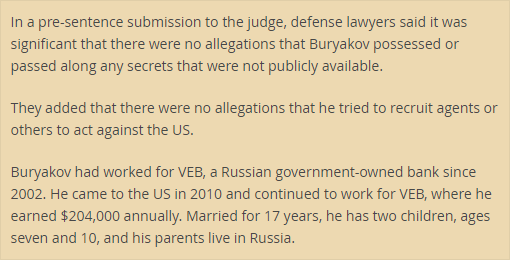
In a pre-sentence submission to the judge, defense lawyers said it was significant that there were no allegations that Buryakov possessed or passed along any secrets that were not publicly available.
They added that there were no allegations that he tried to recruit agents or others to act against the US.
Buryakov had worked for VEB, a Russian government-owned bank since 2002. He came to the US in 2010 and continued to work for VEB, where he earned $204,000 annually. Married for 17 years, he has two children, ages seven and 10, and his parents live in Russia.
On a website called fbistudies, there is an article about Evgeny Buryakov that implies that Buryakov was an illegal – an illegal alien to be specific. (Not all illegals are Mexican). The Guardian article above also mentions a previous Russian spy ring that was referred to as “The Illegals”.
It’s not too difficult to figure out what happened here. Buryakov was living illegally in the U.S. working for a Russian bank when he was approached by an FBI informant who had a story line that would be of interest to a banker. They got him to do some reenactment scenes that they filmed – and when the time was right, they sprang the trap and arrested him. He pleaded guilty to a nonsense charge and ICE deported him after he spent 2 1/2 years in jail.
That was the setup for the spy allegation. Next we see how this connects to Carter Page. In an April 2017 article by ABC News, it was reported:

Undercover FBI agents lured Buryakov and his SVR associates, Igor Sporyshev and Podobnyy, into a trap by masquerading as well-placed business sources ripe for recruitment while using physical and electronic surveillance to gather enough information to build their case.
Buzzfeed was the news outlet that first published the Trump Dossier when no other news outlet would touch it and they were the ones who reported the dubious connections between Carter Page and the three-ring “spy” group that included Evgeny Buryakov. In another Buzzfeed article, they wrote:
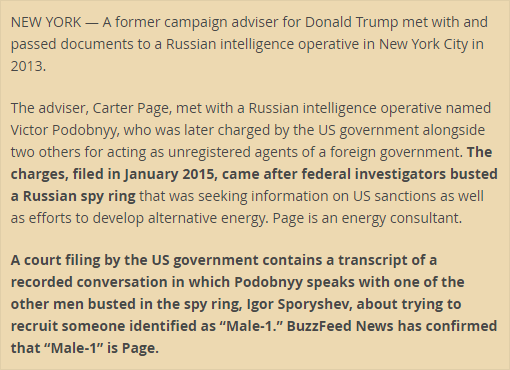
NEW YORK — A former campaign adviser for Donald Trump met with and passed documents to a Russian intelligence operative in New York City in 2013.
The adviser, Carter Page, met with a Russian intelligence operative named Victor Podobnyy, who was later charged by the US government alongside two others for acting as unregistered agents of a foreign government. The charges, filed in January 2015, came after federal investigators busted a Russian spy ring that was seeking information on US sanctions as well as efforts to develop alternative energy. Page is an energy consultant.
A court filing by the US government contains a transcript of a recorded conversation in which Podobnyy speaks with one of the other men busted in the spy ring, Igor Sporyshev, about trying to recruit someone identified as “Male-1.” BuzzFeed News has confirmed that “Male-1” is Page.
That all sounds very dramatic but as you continue reading, you find out that Carter Page met Victor Podobnyy at an Energy Conference in 2013. Over a six month period, Page met with him and emailed him some information on the energy business in the U.S. – all publicly available information. Nothing secret. Not a big deal.
Farther down in the article Buzzfeed wrote:
After federal investigators were looking into the ring, focusing on Podobnyy, Sporyshev, as well as a third man, Evgeny Buryakov, Page was interviewed by FBI counterintelligence agent Gregory Monaghan and another unnamed FBI agent in June 2013, the filing reads.
Podobnyy and Sporyshev were charged in absentia — working under official cover positions, they were afforded diplomatic immunity and were whisked out of the country. Buryakov, who worked under unofficial cover as an employee of state-controlled Vnesheconombank in Manhattan, pleaded guilty to a charge of conspiring to act as a foreign agent. He was sentenced to 30 months in prison and was due to have been released from a federal prison in Elkton, Ohio, on Saturday, and returned to Moscow.
According to the CNN article at the top of this article, Evgeny Buryakov was approached by an FBI informant about a possible casino deal in Russia in 2014 which makes the whole scenario appear to be a set up for Donald Trump.
Donald Trump first considered running for the presidency for the 2012 election. He had an exploratory committee and it appeared at the time to be a serious consideration. I remember it well because I was all in for Trump and was very disappointed when he chose not to run. Trump had a lot of support that was evident on the Internet even at that stage. There is absolutely no doubt that both political parties were watching Donald Trump to see what he would do. That gave the Deep State four years to formulate a strategy – just in case.
When I was looking at Carter Page to find out more about him, I went to the first source – Wikipedia. Novices might snort at the thought but the way to use Wiki is to use the footnotes.
“Page graduated in 1993 from the United States Naval Academy; he was a Distinguished Graduate (top 10% of his class) and was chosen for the Navy’s Trident Scholar program, which gives selected officers the opportunity for independent academic research and study.[10][11][12]”
12 ^Page, Carter W. (May 17, 1993). “”Balancing Congressional Needs for Classified Information: A Case Study of the Strategic Defense Initiative”” (PDF). Ft. Belvoir, Va.: Defense Technical Information Center. http://www.dtic.mil/dtic/tr/fulltext/u2/a271110.pdf
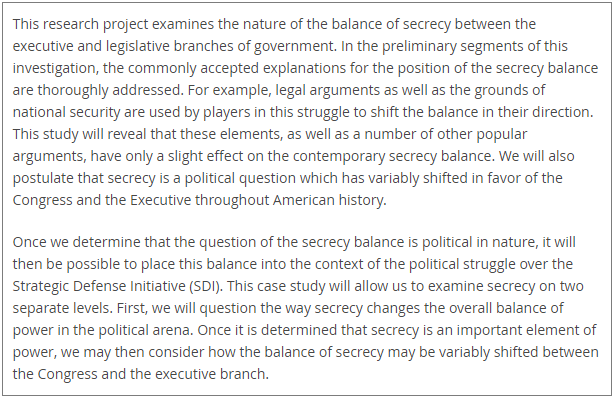
The link was added to the footnote so that it can be seen that it is on a .mil (military) website.
The paper is about the balance of power between the Executive and Legislative branch as it pertains to secrecy. The following is the abstract of the paper:
This research project examines the nature of the balance of secrecy between the executive and legislative branches of government. In the preliminary segments of this investigation, the commonly accepted explanations for the position of the secrecy balance are thoroughly addressed. For example, legal arguments as well as the grounds of national security are used by players in this struggle to shift the balance in their direction. This study will reveal that these elements, as well as a number of other popular arguments, have only a slight effect on the contemporary secrecy balance. We will also postulate that secrecy is a political question which has variably shifted in favor of the Congress and the Executive throughout American history.
Once we determine that the question of the secrecy balance is political in nature, it will then be possible to place this balance into the context of the political struggle over the Strategic Defense Initiative (SDI). This case study will allow us to examine secrecy on two separate levels. First, we will question the way secrecy changes the overall balance of power in the political arena. Once it is determined that secrecy is an important element of power, we may then consider how the balance of secrecy may be variably shifted between the Congress and the executive branch.
The secrecy issue that is the subject of this paper was the Strategic Defense Initiative but the logic of the paper would apply to any issue of secrecy that qualifies as a political question – such as the memo and the criminality of the Justice Department as it pertains to the violation of the 4th Amendment rights of American citizens not to be spied on.
Since Carter Page was the trigger for the alleged Russian collusion investigation and the secrecy under which the Department of Justice, FBI and HomeSCAM are operating became an issue, it begs the question, is it simply an incredible coincidence that Carter Page wrote this paper and the Russian collusion investigation provides the opportunity to test his theories or was it a planned strategy to test the theories by attempting to shift the balance of secrecy from the Executive Branch to the Congress?
What makes that a legitimate question is both the questionable context in which our country is operating and the debate that occurred during the Bush 43 Administration about the theory of Unitary Executive attributed to Dick Cheney and David Addington, Dick Cheney’s Chief of Staff. It’s difficult to find non-partisan discussion of the issue of Presidential Power. Addington was one of the lawyers responsible for the torture memos. His objective was to push presidential power to the absolute limits. The news media of course jumped on that like a bull with a red cape so the other issues concerning presidential power were never discussed in the media. I did find one paper that talked about those other issues.
Rethinking Presidential Power — The Unitary Executive and the George W. Bush Presidency
In 2006, we were very close to a constitutional crisis according to the American Bar Association. I wrote about it at that time. Threat to Constitution both “Imminent and Real”.
The Memo released by Representative Nunes seems to be more about the power struggle between the President, the Agencies of government, the Congress and within the Congress than it is about the stooges in the Justice Department and their soap opera emails. Stay tuned for the next episode of These Are The Days of Our Lives in the Republic where we will continue to document the U.S. Power Problem.
Published with Permission of thetechnocratictyranny.com
